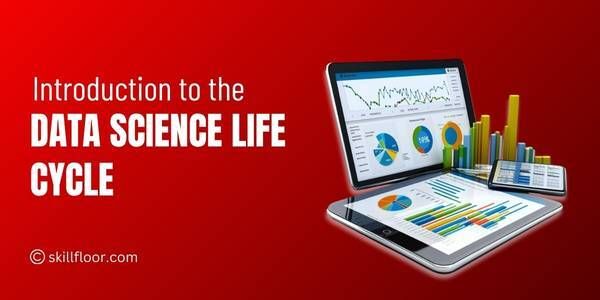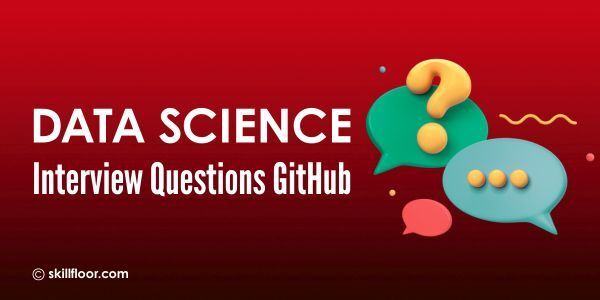Data Scientist Roles and Responsibilities
Want to be a data scientist? Discover what they do, the skills you need, and why it's a great career choice.

Have you ever wondered how much data we produce daily? Every click, post, and search generate data on anything from social media posts to purchasing patterns and health metrics. Businesses are better able to comprehend patterns, make more informed decisions, and enhance performance because of this continuous flow. However, raw data is insufficient on its own; analysis is required to reveal its full potential.
A "data scientist" is not only a "number cruncher" or "data gatherer"; they are specialists in interpreting big, complicated datasets utilizing sophisticated statistical methods, machine learning algorithms, and programming tools. To offer insights that assist businesses in resolving practical issues, they integrate expertise from domains including corporate strategy, computer science, and mathematics.
Skilled individuals are in greater demand as companies become more data-driven. Developing company plans, forecasting trends, and increasing efficiency are all made possible by data scientists. Data science courses equip professionals with the skills needed to make these impactful decisions. As their work drives real-world effects, from healthcare to company growth, while assuring ethical data usage, understanding data scientist roles and responsibilities is essential.
What is a Data Scientist?
A data scientist is a person who solves complicated issues using data. In order to identify patterns and trends that support businesses in making wise decisions, they gather, examine, and interpret enormous datasets. Their work includes transforming unprocessed data into insightful knowledge.
To build models, they employ a variety of instruments and methods, such as machine learning, programming, and statistical analysis. These models aid in understanding consumer behavior and forecasting future events. In many areas, such as healthcare, banking, and e-commerce, where development is fueled by data science driven choices, data scientists play a critical role.
Data scientists require excellent communication skills in addition to technical expertise. In order to assist organizations in making the best decisions, they must properly communicate their results to non-technical staff. In the data-driven world of today, where every industry gains from making more informed decisions based on data, their position is crucial.
Why is the Data Scientist Role So Important?
-
Informed Decision-Making: By evaluating data and offering insights that inform strategies that improve results and spur development, data scientists assist organizations in making more informed decisions.
-
Problem Solving: They assist businesses in overcoming obstacles more successfully by using data to address complicated issues, such as forecasting consumer behavior or streamlining processes.
-
Predictive Analytics: Data scientists analyze trends and possible hazards by creating predictive models, which helps firms remain ahead of the competition and make future plans.
-
Efficiency Boost: By identifying areas for improvement through data analysis, they assist businesses in streamlining procedures and cutting expenses, which eventually boosts overall productivity and efficiency.
-
Customer Insights: Data scientists examine consumer information to assist companies in better understanding consumer preferences and behavior, which results in more individualized services, improved marketing, and more enduring connections with customers.
-
Innovation Driver: Businesses may remain competitive in quickly evolving markets and sectors by using data scientists' ability to reveal hidden patterns in data.
The Growing Demand for Data Scientists
Data scientists are in high demand as more businesses recognize the importance of data in decision-making. They contribute to growth by providing insights that influence company strategy across various industries, from digital startups to established sectors like healthcare and finance. This demand is expected to rise in the coming years due to the ongoing digital transformation.
The role of data scientists is evolving as data becomes a vital element for all companies. In addition to analyzing data, data scientists are increasingly expected to collaborate with cross-functional teams. As the demand for sophisticated, data-driven solutions grows, data scientists will play an even more critical role in determining the success of businesses across all industries.
Key Skills Required for a Data Scientist
The Technical Skills You Need
You need to become proficient in a number of technical skills in order to be a successful data scientist. You can learn these over time, so don't worry!
1. Programming
Python, R, and SQL are among the programming languages that the majority of data scientists are adept in. Because Python offers so many libraries and tools for data analysis and machine learning (e.g., Pandas, NumPy, Scikit-learn), it is particularly well-liked.
2. Mathematics and Statistics
To evaluate data and create models, data scientists require a solid grasp of mathematics and statistics. Everyday activities frequently involve concepts like probability, hypothesis testing, and linear algebra.
3. Machine Learning
Being able to work with machine learning algorithms is crucial for data scientists since a large portion of their work involves creating prediction models. These algorithms help data scientists in identifying trends in the data and formulating hypotheses.
4. Data Visualization
Visualizing data in a way that is understandable to others is crucial for data scientists. Data scientists are assisted in producing visually appealing reports and dashboards that effectively convey insights by tools like Tableau, Matplotlib, and Seaborn.
5. Big Data Tools
Data scientists must be at ease with big data technologies like Hadoop, Spark, and NoSQL databases in order to store and handle massive datasets effectively as the volume of data keeps increasing.
6. Domain Knowledge
A competent data scientist is also knowledgeable about their field. Domain expertise enables them to customize analyses and models to the unique requirements and difficulties of the company, whether it be in the retail, healthcare, or financial sectors.
The Soft Skills You Need
In addition to technical skills, there are also several soft skills that are important for data scientists:
1. Problem-Solving
Data scientists need to be capable of deconstructing complicated issues and using data to discover answers. They can handle problems and provide useful insights that have the potential to have a significant effect thanks to this ability.
2. Communication
It is essential to communicate well. Data scientists must make sure their insights are understood and applicable across teams by communicating their intricate results to non-technical individuals.
3. Critical Thinking
Data scientists need to be critical thinkers that challenge presumptions, see biases, and consider other approaches when analyzing data. This guarantees the validity and soundness of their judgments.
4. Collaboration
Working collaboratively with other professions, including as engineers, analysts, and business executives, is a common part of data scientist roles and responsibilities. The project's success and compatibility with corporate objectives are enhanced by strong teamwork abilities.
5. Attention to Detail
Data scientists must ensure the correctness of data and models by working with great care. Inaccurate conclusions can originate from little errors; therefore, accuracy is essential for trustworthy outcomes.
6. Adaptability
Data science is a field that is always changing. To take advantage of new possibilities and challenges, data scientists need to keep current on the latest tools, methods, and trends.
What Does a Data Scientist Do?
The Core Responsibilities of a Data Scientist
-
Data Collection: First, a data scientist collects pertinent information from many sources, such as social media, sales, and consumer reviews. Making sure the data is complete and suitable for analysis are part of data scientist roles and responsibilities.
-
Data Cleaning and Preprocessing: Errors and missing numbers are common in raw data. Cleaning and preparing the data, converting it into a format appropriate for analysis and modeling, are all part of the Data Scientist roles and responsibilities.
-
Exploratory Data Analysis (EDA): Using programs like R or Python, data scientists search for patterns and trends at this stage. EDA is an essential component of data scientist tasks and responsibilities for developing hypotheses and better understanding data.

-
Model Building: Predictive model building is crucial. A data scientist forecasts future results, such sales or consumer behavior, using previous data. A crucial component of the duties and obligations of data scientists is this.
-
Model Evaluation: A model's correctness is assessed once it is constructed. To provide accurate and useful predictions that satisfy business objectives, data scientists' roles and responsibilities include validating the model on previously unknown data.
-
Communication and Reporting: Data scientists have to effectively communicate their results. Transmitting insights is a crucial component of data scientist tasks and responsibilities for directing business choices, and effective communication and visualizations are critical to this process.
The Role of Data Science in Different Industries
-
Healthcare: Healthcare practitioners may better diagnose patients, forecast disease outbreaks, and evaluate patient data with the use of data science. Models that allow for more individualized care and more effective hospital administration, which improve patient outcomes, are among the data scientist roles and responsibilities in healthcare.
-
Finance: Data science is used in finance to evaluate risk, identify fraud, and improve investment plans. Building algorithms that assess market patterns, assisting financial institutions in making more informed decisions based on data, and preserving financial stability are all examples of data scientist roles and responsibilities.
-
Retail: Data science is used by retailers to manage inventory, improve pricing, and comprehend customer behavior. By offering insightful data for strategic planning, data scientists may improve targeting, boost sales, and increase tailored suggestions when applied to corporate strategy.
-
Manufacturing: Predictive maintenance, supply chain optimization, and industrial quality control are all powered by data science. Analyzing sensor data to reduce downtime, increase production efficiency, and reduce operating costs is one of the Data Scientist roles and duties.
-
Marketing: Data science is used in marketing to segment audiences, evaluate customer behavior, and improve advertising. When it comes to using insights to create marketing plans that increase engagement and optimize return on investment, data scientists are essential.
-
Transportation: In the transportation sector, data science aids in demand forecasting, route optimization, and logistics improvement. Data scientists' duties and responsibilities include assisting businesses in cutting expenses, increasing delivery efficiency, and improving customer service through the analysis of traffic and travel data.
How to Become a Data Scientist
1. Acquire the Required Skills
Gain proficiency in important areas such as data handling, statistics, and programming. Learn how to efficiently analyze and model data using technologies including Python, R, SQL, and machine learning methods.
2. Earn a degree or Certification
An excellent starting point is a degree in data science, statistics, or computer science. As an alternative, obtaining certificates from sites such as edX or Coursera can show your proficiency.
Showcase your work in a portfolio that includes machine learning models, data cleaning, and analysis. Your professional profile is strengthened and prospective employers are shown your talents.
4. Gain Practical Experience
Participate in open-source projects, Kaggle contests, or internships to work on real-world data issues. Gaining practical experience is crucial for improving your abilities and comprehending industry obstacles.
5. Stay Updated with Industry Trends
The field of data science is always changing. To stay ahead in the profession, keep studying by reading blogs or research papers, attending webinars, and attending seminars.
6. Network with Professionals
Participate on LinkedIn, go to meetings, or join data science forums. You may locate employment possibilities, exchange expertise, and keep updated by networking with people in the field.
Understanding Data Scientist Pay
A data scientist's pay in India varies according to geography, experience, and skill level. The yearly salary range for entry-level data scientists is ₹4–8 lakhs, while mid-level experts earn ₹10–20 lakhs. Top cities and firms, such as Delhi, Mumbai, and Bangalore, pay more.
Data scientists with advanced training and experience may make up to ₹30 lakhs or more annually, according to Glassdoor. Data scientists are in high demand in India, particularly in the Internet, e-commerce, and financial industries. Earning potential may be considerably increased by continuing education and keeping abreast of market developments.
Data Scientist Career Opportunities and Pay Outlook
|
Job Role |
Key Responsibilities |
Average Salary (India) |
Salary Range |
Job Outlook |
|
Entry-Level Data Scientist |
Data cleaning, basic analysis, and supporting senior data scientists. |
₹4-8 lakhs per annum |
₹3 lakhs - ₹8 lakhs |
High demand in various industries such as tech, retail, and healthcare. |
|
Junior Data Scientist |
Building basic models, conducting exploratory data analysis, creating reports. |
₹6-12 lakhs per annum |
₹5 lakhs - ₹12 lakhs |
Growing opportunities in AI, ML, and automation industries. |
|
Mid-Level Data Scientist |
Developing predictive models, leading analysis projects, interpreting complex data. |
₹12-20 lakhs per annum |
₹10 lakhs - ₹20 lakhs |
Increasing demand across sectors like finance, e-commerce, and consulting. |
|
Senior Data Scientist |
Leading teams, designing complex algorithms, optimizing models, and guiding strategy. |
₹20-30 lakhs per annum |
₹18 lakhs - ₹30 lakhs |
Strong demand for experts in deep learning, NLP, and big data analytics. |
|
Data Science Manager |
Managing teams of data scientists, project oversight, strategy planning, and mentoring. |
₹25-40 lakhs per annum |
₹20 lakhs - ₹40 lakhs |
Demand for leadership roles, especially in tech and finance sectors. |
|
Chief Data Officer (CDO) |
Setting company-wide data strategy, overseeing analytics projects, and managing budgets. |
₹50-70 lakhs per annum |
₹45 lakhs - ₹70 lakhs |
High demand in large organizations seeking to leverage data for growth. |
The Future of Data Science
Businesses are depending more and more on data to inform their choices, which is driving up demand for data scientists. Data scientist roles and responsibilities are growing, and as technology progresses, this industry will change quickly. Artificial intelligence and machine learning technologies and methods will change the sector and create more specialized jobs.
The complexity and scope of data scientist roles and responsibilities will increase as long as sectors like healthcare, banking, and retail continue to rely on data. Data scientists will be essential to advancing innovation, streamlining corporate processes, and strengthening predictive models. The value of being able to comprehend large datasets will only increase.
The ability to effectively convey findings will be a requirement for future data scientist roles and responsibilities in addition to technical proficiency. Working together with company executives, data scientists will use insights from data to inform strategic choices. Success in the sector will depend on this combination of technical know-how and commercial savvy.
Since data is becoming a vital resource for companies in many sectors, a data scientist's job is more important than ever. Data scientists are increasingly important contributors to the development of business strategies, the optimization of operations, and the promotion of innovation. Data scientist roles and responsibilities are developing. Their proficiency in evaluating intricate information and successfully conveying findings is essential for the success of any firm. A combination of technical know-how and strategic thinking will be needed to address real-world problems and remain ahead of the competition as data scientist roles and responsibilities grow ever more important as technology develops.






























































